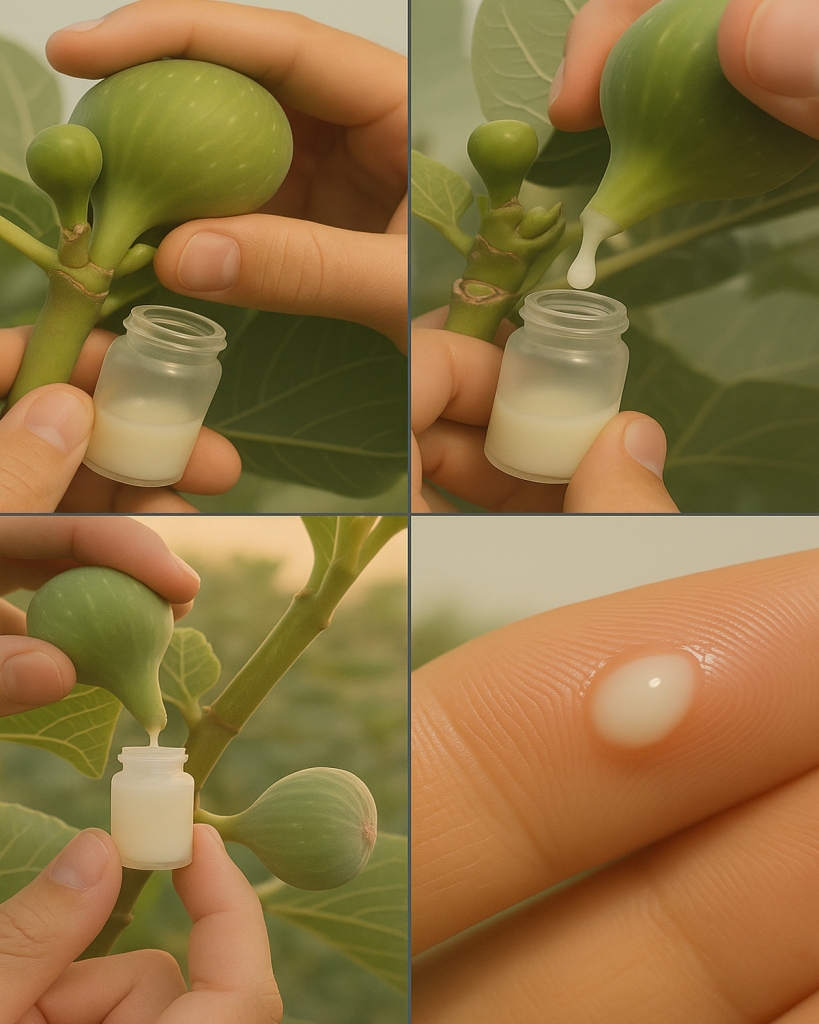What if I told you that a milky sap flowing from a common fruit tree could be as valuable as gold for your health? Surprisingly, fig sap—often overlooked and sometimes even discarded—has been used for centuries in traditional medicine across the Mediterranean, Middle East, and Asia. Yet most people today have no idea of its incredible healing potential.
Rich in enzymes, antioxidants, and bioactive compounds, fig sap has been linked to everything from improved digestion to skin healing. Ancient healers applied it to warts, infections, and wounds, while modern studies are beginning to validate its antimicrobial and anti-inflammatory effects. Imagine holding a few drops of this natural substance and realizing it carries secrets that pharmaceutical companies are only now rediscovering.
In this article, you’ll uncover why fig sap is so extraordinary, how cultures have used it for generations, what science says today, and how you might safely integrate it into your health routine. By the end, you’ll understand why some call it “nature’s liquid gold.”

Why Fig Sap Is Considered “Liquid Gold”
Fig trees (Ficus carica) produce a white latex-like sap that seeps out when the fruit or branches are cut. Though sticky and bitter, this sap is packed with bioactive compounds that act on the body in remarkable ways.
- Proteolytic enzymes: Break down proteins, aiding digestion and healing skin conditions.
- Antioxidants: Neutralize harmful free radicals.
- Antimicrobial agents: Defend against bacteria, fungi, and viruses.
- Anti-inflammatory compounds: Reduce swelling and irritation.
Traditional medicine systems have long praised fig sap as a remedy for skin issues, infections, and internal imbalances. Only recently has modern science begun catching up with these claims.
1. Fig Sap and Digestive Health

One of the most famous uses of fig sap is for supporting digestion.
- Enzymes in the sap help break down food proteins, improving absorption.
- Mild laxative effect supports bowel regularity and prevents constipation.
- Gut-friendly action may help balance intestinal flora.
Everyday Example: In rural Mediterranean villages, small amounts of fig sap were added to warm water or milk to ease indigestion after heavy meals. People reported feeling lighter and less bloated.
2. A Natural Remedy for Skin Conditions
Fig sap has long been applied directly to the skin to treat common issues.
- Warts: Its enzymes can break down tough skin layers.
- Acne: Antibacterial properties reduce pimples and prevent flare-ups.
- Fungal infections: Traditionally used against athlete’s foot and ringworm.
- Wound healing: Antioxidants promote faster skin repair.
Case Story: A farmer in Turkey applied fig sap to stubborn warts on his hands. Within weeks, the growths began to shrink and eventually disappeared—a practice that remains common in folk medicine today.

3. Respiratory and Immune Benefits
Beyond digestion and skin, fig sap may support respiratory health.
- Soothes coughs: Traditionally mixed with honey to calm irritated throats.
- Boosts immunity: Antioxidants strengthen defenses against seasonal illness.
- Clears mucus: Enzymes may help reduce congestion.
While scientific evidence here is still limited, centuries of traditional use make it a promising area for research.
4. Scientific Insights on Fig Sap
Modern research has identified several active compounds that explain fig sap’s healing reputation.
| Compound | Action | Benefit |
|---|---|---|
| Ficin (enzyme) | Breaks down proteins | Digestive aid, wart treatment |
| Polyphenols | Antioxidant | Protects cells from damage |
| Flavonoids | Anti-inflammatory | Reduces swelling and irritation |
| Antimicrobial agents | Kills bacteria/fungi | Fights skin infections |
Laboratory studies suggest that fig sap extracts can inhibit harmful microbes and may even hold potential for cancer research.

5. Everyday Uses of Fig Sap
Here are some safe and traditional ways people have used fig sap:
Topical Application (Warts or Acne)
- Dab a drop directly on the area once daily.
- Wash after 30 minutes to prevent irritation.
Digestive Tonic
- Add 1–2 drops of fig sap to warm water or milk.
- Drink occasionally, not daily, to avoid stomach upset.
Cough Relief
- Mix 1 drop of sap with honey.
- Take before bed to soothe the throat.
Important Note: Fig sap is potent. Always use tiny amounts and test on a small area first.

6. Safety, Risks, and Best Practices
While fig sap is powerful, it’s not for everyone.
- Skin sensitivity: Can cause irritation or burns if overused.
- Internal use: Excess can upset the stomach.
- Allergies: Those allergic to figs or latex should avoid it.
- Medical caution: Not a replacement for prescribed treatment.
Do’s and Don’ts Table
| Do’s | Don’ts |
|---|---|
| Use 1–2 drops only | Apply large amounts directly to skin |
| Test on small area first | Drink daily without guidance |
| Pair with honey or milk | Use on infants or young children |
| Consult a doctor for chronic issues | Replace medical care with sap |

7. Real-Life Experiences
In communities where fig trees grow abundantly, families still rely on the sap for everyday health needs. People often share stories of:
- Warts disappearing after weeks of topical use.
- Relief from stubborn coughs after honey and sap mixtures.
- Improved digestion when taken in moderation.
These stories highlight how nature often provides simple, affordable solutions that stand the test of time.
Conclusion
Fig sap may not be famous, but its benefits are nothing short of extraordinary. With enzymes that aid digestion, compounds that heal skin, and antioxidants that protect the body, it truly earns its reputation as “liquid gold.” Used wisely and in moderation, it can be a valuable addition to natural health routines.
Quick FAQs
- Can fig sap remove warts? Yes, but results vary and take weeks.
- Is it safe to drink fig sap? Only in very small amounts; consult a doctor if unsure.
- Can it replace medical treatments? No, it should complement—not substitute—professional care.
Disclaimer: This content is for informational purposes only and does not replace medical advice. Always consult a healthcare provider before using fig sap, especially if you have allergies, chronic conditions, or are pregnant.




